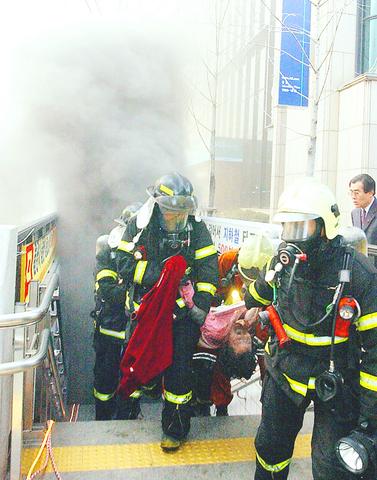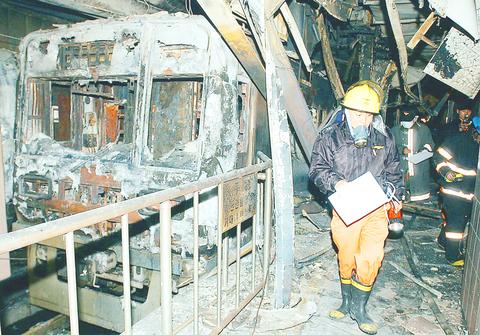About 120 people were killed in South Korea and scores were missing yesterday after flames and smoke engulfed two crowded subway trains following an arson attack, officials said.
The mayor of the southeastern city of Daegu said a 56-year-old male with a history of mental illness was suspected of starting the blaze at the end of the morning rush hour.
A witness said the man had set fire to flammable liquid in a milk carton and tossed it into a carriage.

PHOTO: AP
Officials said a second train pulled into the station as the blaze took hold. The two trains, each with six carriages, had a total of up to 400 people on board.
Daegu Fire Chief Kim Shin-dong told reporters there were more than 70 unidentified charred bodies in the burned-out subway cars, which together with an official figure of 49 dead from hospitals took the toll to around 120.
Figures had switched throughout the day, with many bodies burnt so badly they were impossible to identify immediately.

PHOTO: AP
An official at the Daegu Emergency Rescue Center had said earlier that 134 people had died. Scores of people were still unaccounted for and feared dead.
Many struggled in vain to escape the inferno that reduced the trains to metal skeletons and sent black, acrid smoke belching into the sky for hours after the fire started.
Television footage showed rescuers covering up charred bodies in the ash and soot-filled carriages, a burnt shoe among the wreckage. At street level, relatives and friends gathered anxiously to look through a list of names or held each other and cried.
The number of injured on a board at the emergency center was put at 135, with 159 missing. It was unclear whether the missing included the 70 corpses the fire chief said were still in the trains.
Rescue official Lee Hyong-kyun said the fire ignited seat fabric and floor tiles.
"If you ignite a flammable liquid like gasoline inside a closed space, what you'll get is something very close to an explosion," he said. "There would have been hardly any time to escape."
As dense smoke billowed from subway air vents, soot-covered firefighters in orange suits and with breathing apparatus dragged bodies and the injured up blackened stairwells.
One man, whose wife was trapped by the inferno, told South Korean television he had received a desperate call from her mobile phone.
"Help me," he quoted her as saying. "There's a fire on the subway. The door is locked."
It was a heart-wrenching call others were to make.
"My daughter called me twice at 9.57am crying `mother there's smoke everywhere, but the door won't open!" said a woman at a makeshift crisis center outside Daegu's Joongangro Station.
Rescue officials said they would tow the carriages to a hub station yesterday evening so forensic experts could examine victims' remains.
A fireman in Daegu, which is 300km southeast of Seoul, said the trains had been gutted.
"Everything is gone," said Sung Bo-hun, who was inside the subway until 7:40pm. "You can't recognize the people inside. It is all black and grey."
Telephone firms were helping people find out for sure if their relatives were on the trains by tracing mobile-phone signals.
More than 100 people were killed and another 100 injured in a gas explosion on Daegu's only subway line in 1995.
Yonhap quoted one witness as saying passengers had tried in vain to tackle the suspect in yesterday's blaze. Another said many passengers were trapped behind closed doors.
"When the fire broke out, the people close to the gap between the cars appear to have escaped, but those in the middle of the carriage were helpless," a fireman said.
Most of those injured were being treated for smoke inhalation.

COMBINING FORCES: The 66th Marine Brigade would support the 202nd Military Police Command in its defense of Taipei against ‘decapitation strikes,’ a source said The Marine Corps has deployed more than 100 soldiers and officers of the 66th Marine Brigade to Taipei International Airport (Songshan airport) as part of an effort to bolster defenses around the capital, a source with knowledge of the matter said yesterday. Two weeks ago, a military source said that the Ministry of National Defense ordered the Marine Corps to increase soldier deployments in the Taipei area. The 66th Marine Brigade has been tasked with protecting key areas in Taipei, with the 202nd Military Police Command also continuing to defend the capital. That came after a 2017 decision by the ministry to station

ALL-IN-ONE: A company in Tainan and another in New Taipei City offer tours to China during which Taiwanese can apply for a Chinese ID card, the source said The National Immigration Agency and national security authorities have identified at least five companies that help Taiwanese apply for Chinese identification cards while traveling in China, a source said yesterday. The issue has garnered attention in the past few months after YouTuber “Pa Chiung” (八炯) said that there are companies in Taiwan that help Taiwanese apply for Chinese documents. Minister of the Interior Liu Shyh-fang (劉世芳) last week said that three to five public relations firms in southern and northern Taiwan have allegedly assisted Taiwanese in applying for Chinese ID cards and were under investigation for potential contraventions of the Act Governing

‘INVESTMENT’: Rubio and Arevalo said they discussed the value of democracy, and Rubio thanked the president for Guatemala’s strong diplomatic relationship with Taiwan Guatemalan President Bernardo Arevalo met with US Secretary of State Marco Rubio in Guatemala City on Wednesday where they signed a deal for Guatemala to accept migrants deported from the US, while Rubio commended Guatemala for its support for Taiwan and said the US would do all it can to facilitate greater Taiwanese investment in Guatemala. Under the migrant agreement announced by Arevalo, the deportees would be returned to their home countries at US expense. It is the second deportation deal that Rubio has reached during a Central America trip that has been focused mainly on immigration. Arevalo said his

‘SOVEREIGN AI’: As of Nov. 19 last year, Taiwan was globally ranked No. 11 for having computing power of 103 petaflops. The governments wants to achieve 1,200 by 2029 The government would intensify efforts to bolster its “Sovereign Artificial Intelligence [AI]” program by setting a goal of elevating the nation’s collective computing power in the public and private sectors to 1,200 peta floating points per second (petaflops) by 2029, the Executive Yuan said yesterday. The goal was set to fulfill President William Lai’s (賴清德) vision of turning Taiwan into an “AI island.” Sovereign AI refers to a nation’s capabilities to produce AI using its own infrastructure, data, workforce and business networks. One petaflop allows 1 trillion calculations per second. As of Nov. 19 last year, Taiwan was globally ranked No. 11 for